Last Updated on March 15, 2022
At home or on the go, you’re going to be plugged in, so knowing the difference between a 50 amp and a 30 amp generator plug can be useful. The two types of plugs look similar, but they are not interchangeable. If your RV is equipped with a 50 amp electrical system, then it will only work properly with a 50-amp power cord. The same is true for 30 amp systems and cords.
It’s important to make sure you have the right cord for your RV, otherwise, you run the risk of damaging your electrical system. In this article, we’ll take a closer look at the difference between 50 amp vs 30 amp generator plugs, and we’ll provide some tips on how to choose the right one.
What is a 50 Amp Generator Plug?
A 50 amp generator plug is a type of electrical plug that is used to connect a generator to an RV. The 50 amp plug has three round pins that are spaced two inches apart. It is important to note that the 50 amp plug is not interchangeable with the 30 amp plug, which has three round pins that are spaced one inch apart.
What is a 30 Amp Generator Plug?
The 30 amp generator plug is an electrical plug used to connect a generator to an RV. A 30 amp plug has 4 flat pins that are spaced one inch apart. It is important to note that the 30 amp plug is not interchangeable with the 50 amp plug, which has three round pins that are spaced approximately two inches apart.
Differences between 50 amp vs 30 amp Generator Plug
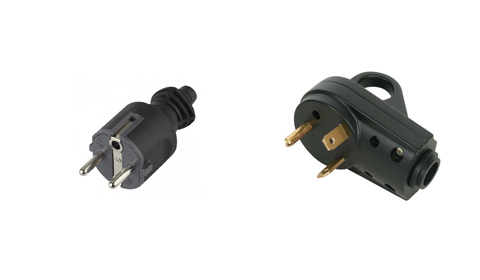
There are a few differences between 50 amp and 30 amp plugs besides amps, those being:
Differences in Size and Weight
Physically, a 50 amp plug is larger than a 30 amp plug. It also has a higher weight due to the fact that it is made with heavier-gauge wire. This can be important if you are traveling with a lot of gear, as the extra weight may impact your ability to move around freely.
Power Consumption
A 50 amp plug is capable of supplying more power than a 30 amp plug. This means that you can run more devices at once using a 50 amp plug. If you have a lot of appliances that need to be plugged in, then a 50 amp system may be the better option for you.
Differences in Environmental Impact
A 50 amp plug has a greater environmental impact than a 30 amp plug. This is due to the fact that it requires more resources to manufacture and results in more waste products.
Noise Level
There is no significant difference between 50 amp and 30 amp plugs when it comes to the noise level. However, it is important to remember that a 50 amp plug will draw more power from the generator, which may result in a higher noise level.
Voltage Rating
It is important to remember that a 50 amp plug has a higher voltage rating than a 30 amp plug. This means that it can safely handle more voltage, which is important if you are using your RV to power high-amperage appliances.
Power Capacity
If you are looking for a plug that has the highest power capacity, then you should choose a 50 amp plug. It can handle up to 6,000 watts of power, whereas a 30 amp plug can only handle up to 3600 watts.
The Differences in Durability
A 50 amp plug is more durable than a 30 amp plug. As a result, it is made from a heavier-gauge wire and has a higher voltage rating. It can withstand more wear and tear, making it a better choice for long-term use.
The Benefits of Using Generator Plug
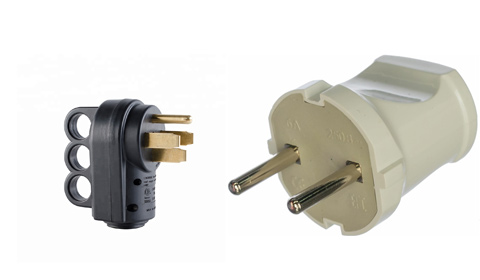
The Benefits of Using a 50 Amp Generator Plug Include:
- Higher Power Capacity: A 50 amp plug has a higher power capacity than a 30 amp plug, which means it can handle more voltage. This is important if you are using your RV to power high-amperage appliances.
- Higher Durability: A 50 amp plug is more durable than a 30 amp plug. It is made from a heavier-gauge wire and has a higher voltage rating. It can withstand more wear and tear, making it a better choice for long-term use.
The Benefits of Using a 30 Amp Generator Plug Include:
- Smaller Size and Weight: A 30 amp plug is smaller and lighter than a 50 amp plug, making it easier to transport.
- Lower Fuel Consumption: Compared to a 50 amp plug, a 30 amp plug consumes less fuel, which makes it more efficient than a 50 amp plug.
- Less Environmental Impact: As a rule of thumb, a 30 amp plug has a lower impact on the environment than a 50 amp plug. This is due to the fact that it requires fewer resources to manufacture and results in fewer waste products.
- Quieter Operation: It is better to choose a 30 amp plug over a 50 amp plug if you want a quieter RV experience.
Tips for using a 50 amp Or 30 amp Plug Safely
Here are a few tips for using a 50 amp or 30 amp plugs safely:
- Always read the owner’s manual for your RV generator before using it. This will provide you with specific instructions on how to safely use the generator.
- Make sure the generator is properly grounded. The risk of electrical shock will be reduced as a result.
- Never overload the generator. That can damage the generator and/or the electrical system.
- Keep children and pets away from the generator. In this way, the risk of injury can be minimized. Always use caution when handling fuel. Never smoke or allow flames to come in contact with the fuel.
By following these tips, you can safely use 50 amp or 30 amp plugs.
Choosing a Generator: Factors to Consider
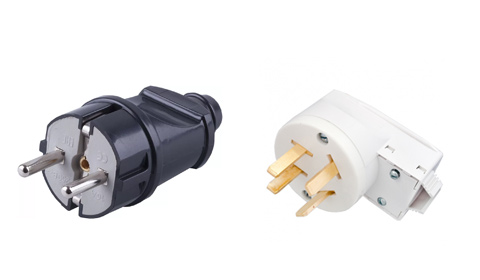
There are several factors to consider, such as the type of RV electrical system, the size of the generator, and the type of fuel. Here is a guide to help you choose the right plug type:
- Type of RV electrical system: Make sure you choose a plug that is compatible with the electrical system in your RV.
- Amount of Power You Need: Choose a generator that has the right wattage rating to power the devices you want to run.
- Weight and Size of the Plug: Consider the weight and size of the plug when making your decision. The 50 amp plug is larger and heavier than the 30 amp plug.
- The Type of Fuel: Ensure the generator you choose runs on the fuel type you want. Gas-powered generators are less expensive, but they produce more noise than diesel-powered generators. Diesel-powered generators are more expensive, but they are quieter and have a longer run time.
- Portability of The Generator: If you want a portable generator, make sure it is lightweight and easy to transport.
- The price: Consider your budget when making your decision.
By considering these factors, you can select the right generator plug for your needs.
Frequently Asked Question
What Generators is Compatible with a 30 amp Extension Cord?
All generators that are rated for a 30 amp plug are compatible with a 30 amp extension cord. This includes both gas-powered and diesel-powered generators.
Can I Use a 50 amp to 30 amps Adapter?
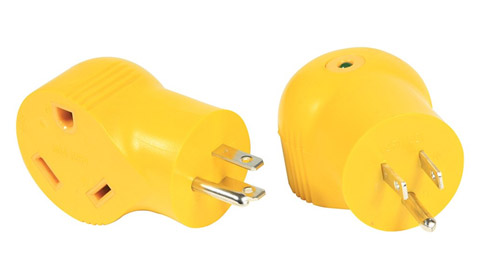
Yes, you can use a 50 amp to 30 amp adapter to convert a 50 amp plug to a 30 amp plug. However, make sure the adapter is rated for the amount of power your generator produces. Do not use an adapter that is rated for a lower amount of power than your generator produces, as this could damage your generator.
Can I Use a Generator with More Than One Circuit?
Yes, you can use a generator with more than one circuit. However, make sure the total wattage of all the devices you are running does not exceed the wattage rating of your generator.
Is It Safe to Plug More Than One Appliance into a Generator At Once?
No, it is not safe to plug more than one appliance into a generator at once. Doing so could overload the generator and cause it to malfunction. Always read the owner’s manual before using a generator, and follow all the safety precautions.
How Do You Hook Up a Generator to a 30-amp RV?
The process of how to hook up a generator to a 30-amp RV is relatively simple. You will need to connect the generator to the RV with a 30-amp extension cord. Make sure the cord is rated for the amount of power your generator produces. Then, you can plug any appliances you want into the outlets on the cord.
What can you run on 50 amps?
You can run any appliance that is rated for a 50 amp plug on a generator with a 50 amp plug. This includes air conditioners, refrigerators, microwaves, and other appliances. You should always read the owner’s manual before using a generator, to make sure you are not exceeding the wattage rating of the generator.
Summary
Choosing the right generator plug for your RV can be confusing, but by considering the factors we’ve outlined, you can make an informed decision that fits your needs. The 30 amp plug is a good option for those who want a lightweight and fuel-efficient plug. All generators that are rated for a 30 amp plug are compatible with a 30 amp extension cord. The 50 amp plug is a good option for those who need more power, as it can run larger appliances. However, it is larger and heavier than the 30 amp plug, and it consumes more fuel.
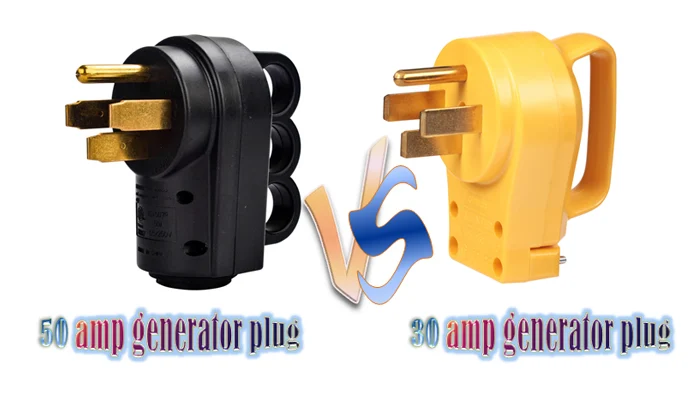



i know very little about electrical issues. i just bought a Predator 4550 generator and it has a 30 amp RV outlet. Will the 30 amp outlet voltage be 120v or 220v?
I have seen 30 amp pigtails with 3 traditional 120v outlets.
Could you please educate me a little?
Thank you,
TR
30 amp outlet voltage will be 120v. 🙂